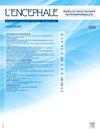Mobile app measuring sleep and behaviors: A trial in adolescents with addiction
IF 1.2
4区 医学
Q4 NEUROSCIENCES
Encephale-Revue De Psychiatrie Clinique Biologique et Therapeutique
Pub Date : 2024-12-01
DOI:10.1016/j.encep.2023.11.007
引用次数: 0
Abstract
Introduction
The smartphones generalisation allows the development of attractive “real-life” monitoring tools for care and research enabling the measurement of addictive behaviours and comorbidities such as sleep disorders. The study objective was to assess the interest of a mobile app collecting such information among adolescents with addictive behaviours in order to enhance the availability of behavioural data in consultation.
Methods
An open label randomised pilot study was held along two parallel arms. The patients randomised to the intervention group (n = 18) used a mobile app to provide daily data for 15 days relating to their sleep and their behaviour (addictive behaviours with or without substances). The patients in the control group (n = 18) used a paper diary allowing the collection of the same data, only the medium differed.
Results
The patients’ median age was 16 years [15.0–16.5]. A median of 67% and 10% of the expected information was completed respectively in the intervention and control groups during the 15 days of follow-up and could be used in consultation (P = 0.08). The patient's knowledge, attitudes, intentions to change, behaviour change and seeking help related to the use of the diaries appeared higher in the intervention group (20.5/30) than in the control group (11/20).
Conclusion
This study described the high patient compliance with the data collection by means of the app. The diary app seems to have been more impactful for patients than the paper diary. This app could represent an important tool to improve the therapeutic alliance and care due to a better knowledge of the behaviours on the part of the clinician but also a better awareness of the patients themselves.
测量睡眠和行为的移动应用程序:在成瘾青少年中进行试验。
简介智能手机的普及使得开发具有吸引力的 "现实生活 "监测工具成为可能,这些工具可用于测量成瘾行为和睡眠障碍等合并症的护理和研究。本研究的目的是评估有成瘾行为的青少年对收集此类信息的手机应用的兴趣,以提高行为数据在咨询中的可用性:方法:按照两个平行臂进行了一项开放标签随机试点研究。被随机分配到干预组的患者(18 人)在 15 天内每天使用手机应用程序提供与睡眠和行为(使用或不使用药物的成瘾行为)相关的数据。对照组患者(18 人)使用纸质日记,收集相同的数据,只是媒介不同:患者年龄中位数为 16 岁 [15.0-16.5]。在 15 天的随访中,干预组和对照组分别完成了预期信息的 67% 和 10%,并可用于咨询(P=0.08)。干预组(20.5/30)患者在使用日记方面的知识、态度、改变意愿、行为改变和寻求帮助的比例高于对照组(11/20):这项研究表明,患者对通过应用程序收集数据的依从性很高。日记应用程序似乎比纸质日记对患者的影响更大。由于临床医生能更好地了解患者的行为,患者自己也能更好地认识到自己的行为,因此该应用程序是改善治疗联盟和护理的重要工具。
本文章由计算机程序翻译,如有差异,请以英文原文为准。
求助全文
约1分钟内获得全文
求助全文
来源期刊
CiteScore
4.60
自引率
7.40%
发文量
162
审稿时长
6-12 weeks
期刊介绍:
Une revue française de renommée internationale.
- Un comite de rédaction représentant tous les aspects de la prise en charge psychiatrique du patient.
- Une sélection rigoureuse d''articles faisant l''objet de plusieurs expertises.
- Des travaux d''auteurs et de chercheurs de renommée internationale.
- Des indexations dans les grandes bases de données (Current Contents, Excerpta Medica, etc.).
- Un facteur d''impact qui témoigne de la grande notoriété de la revue.
La tribune des publications originales de haut niveau.
- Une très grande diversité des sujets traités, rigoureusement sélectionnés à travers des sommaires dynamiques :
- des éditoriaux de médecins référents,
- une revue de presse sur les actualités internationales,
- des articles originaux pour approfondir vos connaissances,
- des mises au point et des cas cliniques pour engager votre réflexion sur les indications et choix possibles au travers de mises en situation clinique,
- des dossiers thématiques pour faire le tour d''une question.
- L''actualité de l''AFPB : L''Encéphale publie régulièrement des comptes rendus de l''Association française de psychiatrie clinique.

 求助内容:
求助内容: 应助结果提醒方式:
应助结果提醒方式:


